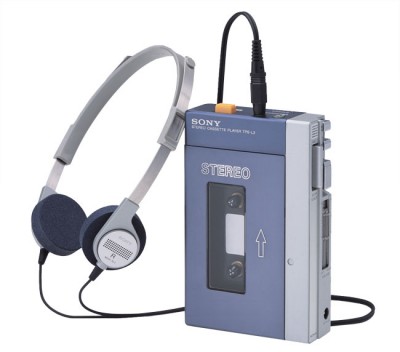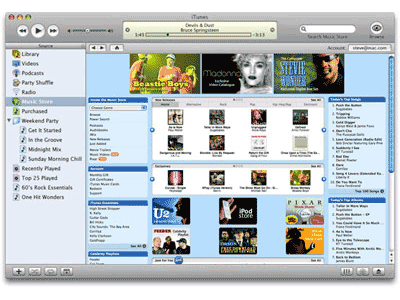« Watchmen | Main | Esio Trot - Roald Dahl »
April 15, 2009
What shall I listen to today?
This is a post about the state of the music industry, and Spotify specifically, but it will rather ramblingly get there through a history of my own listening habits. Sorry about that.

When I wake up in the morning, I am usually thinking about a song. I'll have dreamed it, or it will hit me as I'm getting dressed, and without even being aware, I'm humming the tune in my head. When I was at school, my only chance of actually listening to the real track were fairly slim. Maybe it was a popular song from the charts, in which case I might get to hear it on the Top 40 Chart Show on Sunday evening on Radio 1. Maybe it was something I already had in my puny record/cassette collection, and I could put it on when I got home from school. More likely, it was a classic hit of some kind and I'd just have to wait for it to come up randomly on the radio, but I'd already be humming something else by then so the opportunity was missed. Remember, in the 1970s, I didn't even have a Sony Walkman cassette player - it was that primitive.

Flash forward a few decades. I now have Spotify.
I woke up this morning with Taylor Swift warbling in my head. "Love Story" is a fantasticly catchy hit, in fact, it's a fantastic song all round. Not to everyone's tastes, I recognise that, but I wanted to listen to it. In the bad old days, that would have been the end of it. I cannot afford to buy every single song I like. But today I sat down at my desk at work, plugged my headphones in, and a few seconds later was listening to the full track in glorious stereo on Spotify. For free.
This is important. This importance cannot be underestimated. It is staggering, and I cannot quite believe it actually exists. [1]
The Spotify distribution model is the single most important thing to happen to music since the invention of radio.
Seriously, this is big. This changes everything.

Let's go back again, back to about 1984, when the CD was introduced. How significant was this? To the music industry it was huge. There is a great article here summarising a bit about how much money the record labels made out of CDs. People liked them, their convenience, portability, durability. We replaced many of our favourite vinyl LPs with them - paying more second time around in most cases. But we were still limited by money, and space. Money is simple to understand - no one can buy everything, and so has to choose. Space is also an important limiting factor, and has stopped my buying cheap CDs, the ones I only quite like, in an attempt to reduce some of the clutter in my house.
But just how important to us as consumers was the difference betweeen vinyl and CD. I'd argue not a lot. We had the same choice and the same limits as vinyl, just different packaging. Home taping was still big - borrow a CD from a friend, your home stereo probably had a One-Click copy button. But having the original always appealed, and people built up huge CD collections.

Around the turn of the millennium, things were changing again. Computers suddenly got fast enough to make and play back songs in a compressed format, the MP3. This was important, but you needed a PC, and some basic skills, so the uptake wasn't huge in the beginning. Even now, MP3s are still fairly niche [2]. But if we extrapolate, and MP3 replaces CD, the same problems of price and storage haven't gone away. Most people will still take the legitimate route and pay for their music, and so will be limited by price on what they purchase. With today's huge hard drives, storage space isn't so much of a problem, but it's fantastically more complicated. Your grandad may pop into HMV for a CD, but will he download an MP3 from iTunes, sync it to his iPod, and connect that to his FM tuner in the car. I have enough trouble doing all that myself - I have the same CD in my car for the past two weeks because it's just too much bother to change it.
This is where I digress a little into the stupidity of DRM and MP3 pricing. DRM is how the music industry tried to stop people who bought MP3 songs from sharing them. I say tried, because happily, they completely failed. I didn't ever buy any of these crippled songs, and never would have. Would you buy a CD that only played in the player in your living room? Not in the car, not in the kitchen, not on your portable discman, possibly not even in your living room if you upgraded the CD player there. No. Seems simple and yet the music industry took nearly ten years to realise it was a stupid idea because that is exactly what they were doing with MP3 files.
Also, would you pay the same amount of money for music you downloaded off the internet versus the same songs in a physical package? I very reluctantly had to pay the same or more for tiny CDs instead of the much more tactile and pleasing vinyl albums, but at least I did get something I could hold in my hand, display in my home, and lend to my friends. But an album of MP3 songs costs about £8.00. I have to pay to download it and store it and back it up in case my computer crashes. I can buy the CD online for about the same price usually, or in Tescos. I can convert it to MP3 format very easily myself, DRM free. So why would I buy the MP3?

The only way MP3 was ever going to win was if it was significantly cheaper and DRM free. This has only recently started to happen, Amazon's MP3 store is a good step forward, I bought a couple of albums off there for £3 each recently, my first music download purchases ever.
But it is far too little too late, and in fact, the MP3 prices on iTunes went up only last week. Bonkers. The record industry may think they are starting to win, with MP3 sales increasing, but I think Spotify and it's like has the power to completely kill this market in the next couple of years.
I have spent a significant proportion of my free time building up my MP3 music collection. I like having access to everything I've bought, I want to be able to listen to it wherever I am - which is usually at home or in the office. So I have a portable 160Gb hard drive where all my music is backed up to and which I used to carry everywhere with me. I can plug it into my work PC, or into a friends PC, and play the songs. But I've stopped carrying it around. When I think of a song I'd like to hear now, I search for it on Spotify, and just listen. They have a huge catalogue - not everything, but huge. So far, for me, it's been enough.
"What shall I listen to today?"
That's what I've titled this post. That's what us music lovers are thinking about a lot of the day. That's where Spotify completely blows the competition out of the water. That's where Spotify changes the way we think about music forever [3]. I am no longer limited by price - I can listen to anything for free. I've listened to all of Taylor Swift's album, still find 'Love Story' fantastic, but am glad I didn't buy the whole thing, which I'd have been forced to do in the past. I'm listening to things I like, but would never have bought. Tracks by on compilation albums that never appeared on the artists own CDs. Albums from 1980's bands which I couldn't afford at the time, and didn't buy later because the time wasn't right and yes, money.
I'm also no longer limited by space. Spotify store all the music, so I don't have to. I can listen to the beginning of an album at work, and finish it off when I get home, without carrying it in my pocket. I can even, and this might hurt a bit, give away or sell my CDs and CD storage racks, making more room in my house for books :-) [4]
Everything isn't perfect of course. I think Spotify is an experiment, and though it is really exciting now, sadly I believe it may not last. I haven't bought any CDs/MP3s since I signed up - just can't see the point as I spend about 90% of my waking life near or at a computer and so can listen to everything I want without having to pay. As more and more people sign up to Spotify, sales will go down. This will not go unnoticed by the record industry, and the adverts will not be enough to pay for the shortfall. Spotify will have to start charging, and then everyone will leave. I'm not interested in paying £9.99 a month to 'rent' music. It is a very confusing time to be trying to sell music, and maybe it could even become impossible. I know that if Spotify goes away I'm going to find it hard to part with my cash again to hear new music.
But for now, "What shall I listen to today?"
Well, just about anything.
---
[1] yes, I know all about Last.fm and eMusic. I know about Bittorrent and Kazaa and Limewire. I know about Napster and iTunes music store and Amazon DRM free MP3s. I know about that Russian site (except it's name escapes me, allofmp3 or something). These are ALL different to Spotify. Stepping stones along the way, but not the paradigm shift that Spotify is.
[2] citation needed - how much music is sold on CD vs MP3?
[3] I really hope Spotify doesn't get shut down before a critical mass see it for what it is, and for what it can be. Once people get used to it, there will be no going back, but right now, it could still die.
[4] I will not be doing this - and will write about the reason why later.
[I've only just scratched the surface of this - I've left so much out to try to stick to the point, and I know I've even failed to do that. More updates coming soon. would love to hear other's thoughts.]
Posted by se71 at April 15, 2009 10:12 AM
Comments
Post a comment
Thanks for signing in, . Now you can comment. (sign out)
(If you haven't left a comment here before, you may need to be approved by the site owner before your comment will appear. Until then, it won't appear on the entry. Thanks for waiting.)